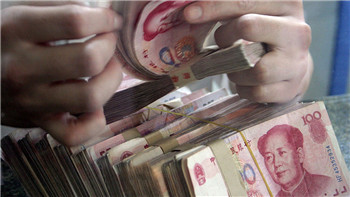(单词翻译:单击)

Would the renminbi be faring better if it were universally known as the redback? One year on from the devaluation that shocked markets, offshore deposits in the Chinese currency have fallen by a quarter, with its share of payments down more than a third.
如果人民币在全世界被叫做“红背”(redback),其表现会不会更好?人民币那次震惊市场的贬值如今已经过去一年,离岸人民币存款已经减少了四分之一,人民币在支付活动中的份额减少了逾三分之一。
The chances are that these falls are cyclical and not directly linked to the currency’s name. But Eurodollar, as the offshore dollar market is known, rolls off the tongue, unlike offshore renminbi , and traders like catchy names.
这些下降可能是周期性的,和人民币叫什么名字并不直接挂钩。但和离岸人民币不同,离岸美元有一个朗朗上口的名字——“欧洲美元”(Eurodollar),而交易员们喜欢朗朗上口的名字。
For those who think China’s rise as a world economic power will continue, internationalising the renminbi is a long-term economic play as well as Beijing policy. Like the Eurodollar market, which developed outside the US in the postwar period, its use will ultimately be determined by demand outside its home country. Along the way, however, the renminbi will be buffeted by events.
对于那些认为中国崛起为世界经济强国的进程还将持续的人而言,人民币国际化既是北京方面的一项长期政策,也是一场长期的经济竞赛。就像战后在美国以外发展起来的欧洲美元市场一样,人民币在国际上的使用最终将由本国以外的需求决定。然而,人民币在国际化的过程中将受到种种事件的冲击。
Looking at payments and deposit data, buffeting is what has happened. Surprised by the volatility and weakness in the past year, mainland companies have been paying down dollar debt and have drawn on offshore renminbi to do so. Retail savers who thought the currency a one-way appreciation bet have had to think again. In another example of products with a catchy name, dim sum bond issuance — offshore renminbi debt — has fallen too as the costs of borrowing offshore have risen.
纵观人民币支付和存款数据,就能发现冲击的迹象。中国内地企业对过去一年中的波动和疲弱感到意外,它们一直在偿还美元债务,并且一直在动用离岸人民币来偿还美元债务。此前押注人民币将单向升值的零售储户不得不反思。由于离岸借贷成本上升,另一个名字朗朗上口的产品——点心债券(dim sum bond,离岸人民币债券)的发行也减少了。
The renminbi’s use in payments has slid from a 2.79 per cent share in August 2015 to 1.72 per cent in June, according to Swift, the payments service. Over that period it has gone from ranking fourth, ahead of the yen, to sixth, behind the Canadian dollar. At the same time the number of banks able to deal in it has risen by a 10th, suggesting that the financial system is still only partway through the process of gearing up to handle the currency.
根据支付服务“环球银行金融电信协会”(SWIFT)的数据,人民币在支付活动中的使用份额已从2015年8月的2.79%下滑至今年6月的1.72%。在这期间,人民币在全球使用最多的支付币种中的排名,从第四名(排在日元之前)下滑至第六名(排在加拿大元之后)。这还是在能够以人民币交易的银行的数量增加了十分之一的情况下发生的,这表明金融体系还没有完全做好经手人民币的准备。
Now to find a name. Eurorenminbi is out. The market codes — CNH for offshore and CNY for mainland — are not a headline writer’s dream. Dim sum is taken, as is panda for onshore bonds. Redback is gaining currency but there is room for something better. Yuan-related puns have been banned in the Financial Times as tired and mispronounced. One colleague suggests bamboo bucks, another dragonbacks. Ideas on a postcard, please.
该为离岸人民币想个朗朗上口的名字了。“欧洲人民币”肯定不行。人民币的市场代码——CNH代表离岸人民币,CNY代表在岸人民币——也不妥,想要拟出醒目头条的作者肯定不喜欢这名字。“点心”这个名字已经被占用了,同样,“熊猫”也被境外机构在华发行的人民币债券占用了。越来越多的人开始使用“红背”这个名字,但应该还有更好的名字。英国《金融时报》内部已禁止使用和“Yuan”相关的双关语,因为它们老套、容易念错。一名同事建议用“竹元”(bamboo buck),还有一名同事建议用“龙背”(dragonback)。请读者们踊跃贡献创意。


